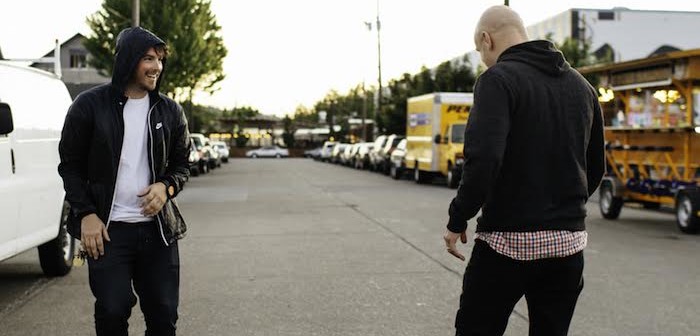It’s standard procedure for a band member to take an interview call from the green room while on tour or from their home when they’re off the road. But Nic Newsham is anything but standard. He answers from a dark attic while working his day job as an electrician—multitasking at its finest. Since the disbandment of his former band, Gatsby’s American Dream, Newsham has dabbled in music with a few side projects, but nothing ever stuck. That is until he joined forces with another former Gatsby’s member, Bobby Darling.
Together, the two now make up The Money Pit.
The indie rock sound presented on their debut self-titled album is something that Gatsby’s fans will appreciate and everyone else will easily be drawn into. We caught up with Newsham to talk about his decision to continue making music with Darling, the concept behind their debut album and why they’re so obsessed with literary and cinematic references.
Highlight Magazine: Was there ever a point after Gatsby’s American Dream ended where you thought that might be the end of your career? Or did you know that you would continue in music?
Nic Newsham: I’ve always wanted to make music and I knew that I would always be making music in some capacity whether it be for nobody, just for myself and some friends, or actually release some stuff that more people would listen to. It’s always been more about the music and less about how many people are going to hear it, but it’s kind of fun to have more people hear stuff. [Laughs.] This time around we actually are really putting it out there and playing a bunch of shows and giving it an effort.
HM: So how did this project come about? Was it something tucked away for years just waiting to make an entrance?
NN: No, Bobby [Darling] lives across the country. We hadn’t really spoken to any length in years, and then all of a sudden in my email I found an MP3 track from him and was like, “Oh what’s this?” So I wrote something to it and emailed it back. He liked what I was doing and what I was talking about, and I liked what he was doing. We’d written so many songs previously together that it was like riding a bike. It was really organic. He just sent me stuff and I would write to it. He said, “Let’s make a record,” and that’s what we have today.
HM: Gatsby’s obviously had literary and cinematic ties to the name and The Money Pit does too. Are film and literature something that really influence you or was that just a coincidence?
NN: Bobby’s a book nerd and myself—we all love movies. Honestly, the name The Money Pit didn’t have anything to do with the movie. I’m knowledgeable of it; I like that movie. It was more like this project is something that I felt like him and I were throwing money at forever. We created a money pit after a while. We didn’t have a label or anything, just financing everything ourselves. We felt that crunch a little bit. I guess if you have a little skin in the game, it means a little more.
HM: A lot more bands are going the independent route these days.
NN: Well yeah and it’s easier now than ever.
HM: Especially with social media and everything. You don’t necessarily need a big label to get the word out. You catch on with a few people and you can take it somewhere.
NN: Yes, the game has changed, and we are just trying to play catch up because we’re kind of out of touch old guys, but I feel like we write good enough songs so hopefully that’s good for something.
HM: Your first release with The Money Pit is self-titled. Most self-titled albums become career-defining records for bands. Do you hope that happens with this collection?
NN: We had a working title; it was Yeti, but as the album molded and became what it is, it didn’t really fit. It didn’t really fit with the narrative of what the lyrics were about. We just ended up saying, “Forget it. Let’s just go self-titled.” I do really think it’s a statement of “Hey! We’re here. We’re back. This is the Money Pit. Just remember that name. Let’s not confuse things with an album title.”
HM: Gatsby’s ended with a self-titled record and Money Pit is starting with that. Is this kind of picking up where you left off but heading in a brand new direction?
NN: Whoa! I think that’s a perfect way to put it. I didn’t really think of it like that. That’s awesome. That makes a ton of sense. I can’t say it was on purpose, but I mean I think that is why it made sense for us to do it that way. It is kind of picking up where we left off in that case.
HM: The songs are effortless without being so if that makes any sense. It’s just great music, plain and simple. It’s definitely a breath of fresh air in the music industry right now. What was it like recording this batch of songs?
NN: It was fun, and I think that’s what comes across. I don’t know how fun it had been for a while so now we got to go back to the heart of it. Shoot, when I met Bobby we were 21 maybe and music was just a fun thing to do with your friends on the weekend. Kind of getting back to that mentality of “Oh music is actually enjoyable” as much as it can all get confounded with so many other things in life when it comes down to it. Writing a good song is like it’s own best reward. When you have that approach, everything comes out a little easier and I think that translates. You can actually tell by listening to these songs that we are enjoying ourselves.
HM: You guys recorded with Casey Bates (Pierce the Veil, Portugal the Man, Foxy Shazam). He worked with you on several Gatsby’s releases. Was it a familiarity with his work that drew you to work with him again?
NN: The funny thing is that’s Bobby’s childhood best friend. Bobby actually taught Casey how to play guitar. The first real record [Casey] ever did was Gatsby’s American Dream’s Volcano so we have a long relationship with him. I actually introduced him to my sister, and they got married so he’s my brother-in-law and he lives right up the street. So it was kind of a no brainer.
HM: I want to talk for a minute about the album artwork. I just took a closer look at it and noticed all the words— “Get 8 hours of sleep,” “Do not question authority,” etc. They’re all statements that are fed to us throughout our lives by society and things we feel like we have to conform to. Where did the idea for the artwork come from?
NN: It’s inspired by this movie called They Live starring “Rowdy” Roddy Piper. It was a cult flick in, I believe, the ‘80s, early ‘90s. It had a lot of imagery like that. Just this non-conformist, don’t believe everything that’s being told to you from advertisements, television and its actually the same movie that Shepard Fairey got the idea for OBEY clothes. We thought that was cool. We hooked up with Brandon Proff of Fear Before The March Of Flames. He’s an awesome artist so we said, “What do you think for this album?” and he busted that out. We told him we liked the concept from the movie, They Live, and that’s what he came up with.
HM: Do you think it goes along well with the message you guys are trying to get across in the album?
NN: I think so. I hope so! When I saw the artwork, I was like, “Oh this totally makes sense with what we’re trying to do.”
HM: It also relates to what you guys went through with Fearless Records and your last album as Gatsby’s. Just about wanting to do your own thing and not really going with what other people want you to do.
NN: Yeah, exactly. I guess at the end of the day it’s like an old school punk epic of doing things yourself and fuck anybody who’s going to tell you different. Whether that’s to our benefit or detriment, at least it comes from us.
HM: You guys came up in a scene-defining time on Fearless Records. What’s the most different thing about today’s music industry as opposed to when you were coming up? Do you think it’s better? Worse?
NN: Social media has definitely changed everything. The industry has shrunk, which has pros and cons. There’s a lot less money in the industry especially for rock music. Radio isn’t even a thing that even counts for anything anymore. So I don’t know there’s so many pluses and so many minuses, but for us, we can just get in close contact with fans right away. [There’s] kind of a positive and negative side to all of it. I think it’s a lot different depending on the scale your band is. If you’re just starting and trying to get out there, it can be tough because there’s so much media to consume, there’s so many new bands, there’s constantly something coming out and it’s hard to not get lost in the fray. Hopefully we can do something that stands out and is memorable to people.




